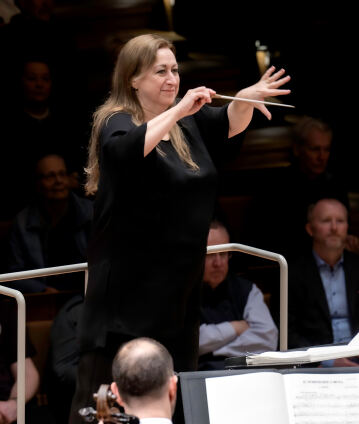Simone Young conducts Bruckner and Rihm

Simone Young prefers to conduct Anton Bruckner’s symphonies in their original versions: “Perhaps these are not as perfect as the later ones. But they have a modernity that the later ones lack.” Here she combines the original version of the Second Symphony with Wolfgang Rihm’s nocturnal scene Das Gehege (soloist: Vida Miknevičiūtė). This sombre one-person piece is about a woman who, on the eve of German reunification, frees an eagle from its captivity, tries to seduce it, and ultimately kills it.
The subtitle of Wolfgang Rihm’s Das Gehege is A nocturnal scene: a setting of the final scene from Botho Strauss’s Schlußchor. This three-part theatre piece was written for Bayerische Staatsoper as a companion piece to the one-act opera Salome by Richard Strauss based on Oscar Wilde. With ironic detachment, Rihm stages a monodrama interspersed with orchestral interludes, which borrows some of the motifs from Salome and contains many other allusions to German theatre, music and history. There are echoes of the German national anthem as well as Beethoven’s Ninth, which was ever-present at the time of reunification. The protagonist of the play was born in the GDR and is a supporter of the monarchy. On the historic night of the fall of the Berlin Wall on 9 November 1989, she comes into conflict with herself and her dreams – symbolised by the eagle as the German heraldic animal – full of yearning and anger, until there is nothing left of the erotic, national euphoria of reunification.
After Rihm’s Gehege with dramatic soprano Vida Miknevičiūtė, who is already well-known to Philharmoniker audiences, Simone Young presents Anton Bruckner’s Second Symphony. The Australian conductor has opted for the uncompromising original version from 1872, which is technically more demanding and around ten minutes longer. It shows a composer full of determination and fervour, setting out to conquer the musical world. Although his full recognition as a symphonist was yet to come, the premiere of the Second, which Bruckner conducted himself at the end of the Vienna World’s Fair, was one of his few triumphs in the Austrian capital.
© 2024 Berlin Phil Media GmbH
Related interview